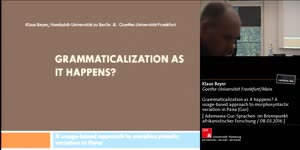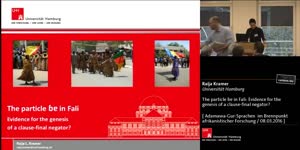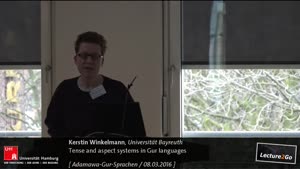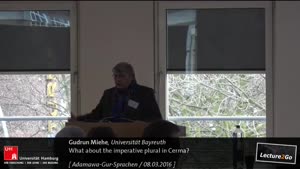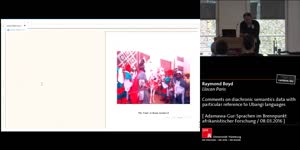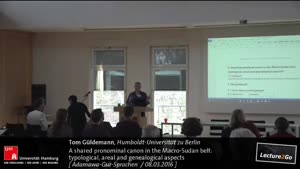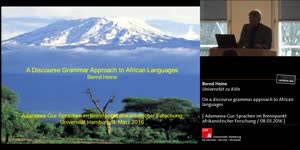Infinitives in Central Adamawa class languages - Ulrich Kleinewillinghöfer - University of Hamburg
- Lecture2Go
- Catalog
- F.5 - Geisteswissenschaften
- Asien-Afrika-Institut
- Adamawa-Gur-Sprachen im Brennpunkt afrikanischer Forschung
Catalog
Infinitives in Central Adamawa class languages
The citation form of verbs in Lɔŋto, Gimnime, and Gəunə́m, noun class languages in three different subgroups of Samba-Duru (Central Adamawa), are nominalised verb forms which may best be labelled as "infinitives". These infinitives are also used in progressive constructions.
In most class languages of the Vere subgroup of Samba-Duru (as well as in Doyayo), however, infinitives appear to be absent. There, verbs in general are rather cited as "verbal nouns", a nominalised verb form which is likewise used in progressive constructions. (Alternatively verbs may also be cited as imperatives.)
The decisive morphological characteristic distinguishing the respective citation forms is that the verbal nouns in Vere group languages are built with noun class morphemes, mostly with the class corresponding to the *ko class of Central Adamawa (cognate to Volta-Congo class 15 *kʋ); whereas the "infinitives" in the related class languages do not belong to any of the noun classes in the respective class systems, yet their characteristic morphemes -nɛ (Lɔŋto), -na (Riitime), -ni (Beiya, Gəunəm), -le (Bəərəm) are nevertheless of common origin.
The paper aims at giving an overview of the relevant evidence in Samba Duru class languages and inspects the probability that an "infinitive" marker which was not (or only partially) integrated into the noun class system may be set up as part of the common morphological heritage in certain branches of Adamawa-Gur.

